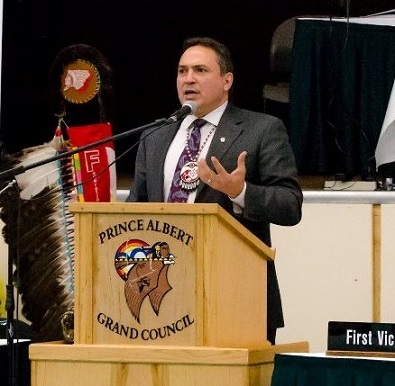AFN Chief Perry Bellegarde addressing delegates at FSIN Assembly in Prince Albert. Photo courtesy of FSIN.
Assembly of First Nations Chief Perry Bellegarde says there have to be changes made to ensure federal funding flows quickly and becomes more effective for First Nations communities.
Bellegarde was addressing delegates of the annual Federation of Sovereign Indigenous Nations this morning in Prince Albert, and says those changes have to come from the bureaucracy within government. He says that in some cases, some First Nations are still waiting on funding from Indigenous and Northern Affairs Canada (INAC) that was committed in the 2015/16 fiscal year budget.
“The prime minister and cabinet’s visions are huge, but unfortunately, the bureaucracy in the department of Indigenous Affairs is narrow,” said Bellegarde. “They still operate under the old way of doing business.”
The AFN chief says there might be increased dollar amounts in the recent federal budget, but there have to be more effective ways and means of getting those funds out to the communities in a more efficient way.
“Within the department of Indigenous Affairs, there have to be more effective policies and procedures put in place, and that goes for all the departments,” says Bellegarde. “Government says one thing and cabinet says one thing, but the bureaucracy is the one that has to catch up to speed, and the AFN and FSIN have to find effective and efficient ways to do that, because it’s not getting out to the communities.”
Bellegarde says there are policy changes that have to happen sooner than later with the prime minister’s office and Privy Council, which helps administer government.
Bellegarde also used his address to speak to the progress of the national commission on murdered and missing Indigenous women and girls. Earlier this week, an open letter, released by more than 30 advocates, Indigenous leaders and family members, expressed their misgivings to the inquiry’s chief commissioner. In the letter, concerns were raised about the lack of communication between the inquiry and families that was causing anxiety and frustration.
“If family members have concerns, I have concerns,” he says there has to be support for the commissioners, so the families find space to be heard. “If they (the commission) find that there isn’t enough time, the AFN can ask for an extension of the hearings. If they feel there aren’t enough resources, we can help push for that as well,” he added.
Bellegarde says it’s all about finding closure and justice for the families impacted, and coming up with recommendations to help end violence in First Nations communities.
“We don’t have to wait until the end of the inquiry,” he added. “Things like investments in daycare, transportation and housing, those things can happen now.”
He says while the commission is reviewing their findings, there is much that the federal, provincial, municipal and First Nations governments can do to address the root causes of the situation.
